Abstract
Our interest in early indicators of social relationships grows out of research on aggressive behavior, and we seek to add to the knowledge of its forms and causes and of possible ways to regulate it. Our studies of aggressive behavior stem from a more general interest in the processes that regulate personality development and adaptation. Within this framework, the studies that we present here show that the various manifestations of aggression represent valuable indicators of the individual’s relationship with reality and hence of his or her capacity for adaptation (Caprara, 1972). Although this approach is hardly new in psychodynamic and personality research, it is one that remains as yet very underdeveloped, as seen in the frequent ambiguity of the term aggression and the generic nature of the concept of adaptation. As a result of this, the findings of our research will hopefully provide an original contribution to this field.
This research was supported in part by a grant from the Ministero della Pubblica Istruzione for 1989–1990
Access this chapter
Tax calculation will be finalised at checkout
Purchases are for personal use only
Preview
Unable to display preview. Download preview PDF.
Similar content being viewed by others
References
Achenbach, T. M., & Edelbrock, C. A. (1983).Manual for the child behavior checklist and revised child behavior profile. Burlington: Author.
Achenbach, T. M., & Edelbrock, C. A. (1986). Manual for the teacher’s report and teacher version of the child behavior profile. Burlington: Author.
Berkowitz L. (1974). Some determinants of impulsive aggression: Role of mediated associations with reinforcements for aggression. Psychological Review, 81, 165–176.
Berkowitz L., & Le Page, A. (1967). Weapons as aggression-eliciting stimuli. Journal of Personality and Social Psychology, 7, 202–207.
Caprara, G.V. (1972). Aggressivita’e comportamento aggressivo [Aggressiveness and aggressive behavior]. Milan: Celuc.
Caprara, G.V. (1986). Indicators of aggression: the dissipation-rumination scale. Personality and Individual Differences, 17, 23–31.
Caprara, G.V. (1991). Bambinisocialimente sgrammaticati: scostamenti marginali, effetti aggregati e violazione della continuita’. Eta’ Evolutiva (in press).
Caprara, G.V., Alcini, P., Mazzotti, E., & Pastorelli, C. (1988). Sviluppo e caratteristiche di tre scale per la misura dell’aggressivita’ fisica e verbale, del comportamento prosociale, dell’instabilita’ emotiva [Development and characteristics of three scales measuring aggression, prosocial behavior and emotionalinstability]. In G.V. Caprara & M. Laeng (Eds), Indicatori e Precursoridella condotta aggressiva (pp. 121–143), Rome: Bulzoni.
Caprara, G.V., Borgogni, L., Mazzotti, E., & Pastorelli, C. (1988). Indicatori precoci della relazione sociale [Early indicators of social relation]. Eta’ Evolutiva, 29, 91–101.
Caprara, G.V., Cinanni, V., d’Imperio, G., Passerini, S., Renzi, P., & Travaglia, G. (1985). Indicators of impulsive aggression: present status of research on irritability and emotional susceptibility scales. Personality and Individual Differences, 6, 665–674.
Caprara, G.V., Coluzzi, M., Mazzotti, E., & Zelli, A. (1985). Effect of insult and dissipation-rumination on delayed aggression and hostility. Archivio di Psicologia, Neurologia e Psichiatria, 46, 130–139.
Caprara G.V., Gargaro T., Pastorelli C, Prezza M., Renzi P., & Zelli A. (1987). Individual differences and measures of aggression in laboratory studies. Personality and Individual Differences, 8, 885–893.
Caprara, G.V., & Pastorelli, C. (1989). Toward a reorientation of research on aggression. European Journal of Personality, 3, 121–138.
Caprara, G.V., & Rastorelli, C. (1991). Early indicators of emotional instability, prosocial behavior and aggression. Submitted for publication.
Caprara, G.V., Renzi, P., Amolini, P., d’Imperio, G., & Travaglia, G. (1984). The eliciting cue value of aggressive slides reconsidered in a personological perspective: the weapons effect and irritability. European Journal of Social Psychology, 14, 313–322.
Dodge, K.A. (1985). Attributional bias in aggressive children. In P.C. Kendall (Ed.), Advances in. cognitive-behavioral research and therapy (Vol. 4). Orlando: Academic.
Dodge, K.A., & Crick, N.R. (1990). Social information-processing bases of aggressive behavior in children. Personality and Social Psychology Bulletin, 16, 8–22.
Ekman, P., & Friesen, W.V. (1975). Unmasking the face. Englewood Cliffs, NJ: Prentice-Hall.
Eron L.D., & Huesmann L.R. (1984). The relation of prosocial behavior to the development of aggression and psychopathology. Aggressive Behavior, 10, 201–211.
Miller, P.A., & Eisenberg, N. (1988). The relation of empathy to aggressive behavior and externalizing/antisocial behavior. Psychological Bulletin, 103, 324–344.
Parke, R.D., & Slaby, R.G.(1983). The development of aggression. In M. Hetherington (Ed.), Handbook of child psychology (Vol. 4, 4th ed., pp. 547–642). New York: Wiley.
Pastorelli, C., Mazzotti, E., & Prezza, M. (1988). Validazione delle tre scale per la misura dell’aggressivita’ fisica e verbale, del comportamento prosociale e dell’instabilita’ emotiva, con i metodi della valutazione e della nomina dei pari [Validation of three scales measuring aggression, prosocial behavior and emotional instability, with teacher rating and peer nomination]. In G.V. Caprara & M. Laeng (Eds.), Indicatori e precursori della condotta aggressiva (pp.121-143). Rome: Bulzoni.
Weiner, B. (1986). An attributional theory of motivation and emotion. New York: Springer.
Weiner, B., Graham, S., Stern, P., & Lawson, M.D. (1982). Using affective cues to infer causal thoughts. Developmental Psychology, 18, 278–286.
Weiner, B., & Handel, S. (1985). Anticipated emotional consequences of causal communications and reported communication strategy. Developmental Psychology, 21, 102–107.
Editor information
Editors and Affiliations
Rights and permissions
Copyright information
© 1992 Springer-Verlag Berlin Heidelberg
About this chapter
Cite this chapter
Caprara, G.V., Pastorelli, C. (1992). Early Determinants and Correlates of Aggressive Behavior. In: Fra̧czek, A., Zumkley, H. (eds) Socialization and Aggression. Recent Research in Psychology. Springer, Berlin, Heidelberg. https://doi.org/10.1007/978-3-642-84653-3_7
Download citation
DOI: https://doi.org/10.1007/978-3-642-84653-3_7
Publisher Name: Springer, Berlin, Heidelberg
Print ISBN: 978-3-540-54799-0
Online ISBN: 978-3-642-84653-3
eBook Packages: Springer Book Archive




